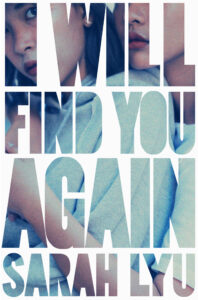Sarah Lyu on depression and her most personal novel yet, I Will Find You Again
"Please know that you don’t have to shoulder the pain by yourself."
This post was written by Sarah Lyu, author of I Will Find You Again
Content warning: depression, suicidal ideation
In the summer of 2014, I was driving from New York City to a small town in northeastern PA almost every week, and a persistent thought flashed through my mind whenever I saw a truck passing on the other side of the winding, rural roads in Pennsylvania: What if my hand just slipped on the wheel? In the depths of my depression, I imagined it would be painless, and in my desperation, I convinced myself that the other driver would escape unscathed.
Depression and I, we have a long history. I discovered the idea of suicide for the first time in fifth grade and felt a disturbing sense of relief from the thought of ending my own life. This pull of the void would haunt me all the years of my adolescence and early adulthood, peaking during that summer of long drives.
But it wasn’t really my life that I wanted to end. On paper, nothing was wrong: I liked my work editing children’s books and I had supportive coworkers and bosses; I was engaged to the person who is now my husband. It wasn’t apparent to me then, but I now know that what I wanted very desperately to end wasn’t the life I had but the pain I was in, a mental anguish that’s instantly recognizable to those who’ve experienced it but hard to convey to those who haven’t. For me, depression presented itself as angry and abusive self-talk. I felt guilty and anxious all the time—that I wasn’t working hard enough, that I wasn’t smart or nice enough, that I was and would always be a failure. Nothing I did was good enough; nothing I could do was worth anything. It was easy then, to believe it’d be better for everyone if I were gone.
In the depths of my depression, I couldn’t tell anyone in my life exactly how I felt because it was impossible to explain the mistaken beliefs I held about myself. Even so, part of me knew the constant stream of sharp internal criticism was a form of self-harm and that my thoughts weren’t logical. That’s the thing about mental illness—it doesn’t make sense to anyone on the outside, but inside, I was absolutely, obsessively gripped by the cacophony of voices telling me I was worthless and better off gone. I’d never felt so alone.
View this post on Instagram
It’s taken me years and years to write about that period of my life, about the sadness and confusion and pain. I could only do it through fiction, where I felt safe because I could give all that anguish to my characters and work through it alongside them. This is what ultimately became the most personal novel I’ve ever written—I Will Find You Again, a love story about two girls, Chase and Lia, who both struggle with depression and anxiety in different ways. I wrote it for myself but I also wrote it for anyone who’s felt that same isolation and desperation, because I want you to know that you aren’t alone.
I want you to know that even if you don’t think you deserve help, you do. That no matter how many times you’ve hurt yourself, you can do one thing today to break the pattern, take that first step toward healing. For me, that first step was asking my partner to drive me to a psychiatric hospital where I checked myself in for treatment.
There’s a concept familiar to those who practice cognitive behavioral therapy—asking yourself for evidence to support your thoughts and beliefs. It’s a reality check, but it can also be a way to build the reality you want to live in. My reality had been filled with dark thoughts and crushing hopelessness, but in taking that first step asking for help, I provided myself with the first piece of evidence that I knew I deserved help even if I didn’t feel it in my bones, that I could one day get better even if I didn’t believe it was possible yet. That act was a leap of faith and the first brick of the foundation that would become my recovery. Even now when I have bad days (or bad months), I look back and see that moment as proof that I took action to save myself, that I can care for myself.
Maybe this note finds you in a low place, maybe even the lowest of places, though I hope not. But if you’re there, please know that you’re not alone. Please know that you don’t have to shoulder the pain by yourself. That asking for help is an act of courage and proof, no matter how small, that you want to get better and that you can. I want you to know that I’m rooting for you.
Resources
Depression
Teenline
https://www.teenline.org/youth
800-852-8336
Depression and Bipolar Support Alliance Local Groups
https://www.dbsalliance.org/support/chapters-and-support-groups/find-a-support-group/
Suicide
U.S. National Suicide Prevention Lifeline
1-800-273-TALK (8255) or 988
Outside of the U.S.
UK: 116 123
Australia: 13 11 14
Visit IASP.info or Suicide.org
 Get your copy of I Will Find You Again by Sarah Lyu here.
Get your copy of I Will Find You Again by Sarah Lyu here.


